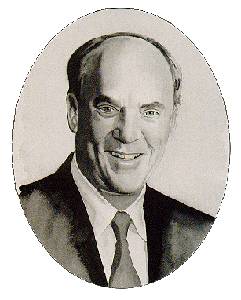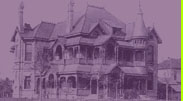WHO'S WHO - ROBERT C. McNAIR, SR.
 Robert C. (Bob) McNair was born in Tampa, Florida in 1937. McNair grew up in western North Carolina and graduated from the University of South Carolina in Columbia, where he was initiated into the Sigma Chi Fraternity, in 1958 with a Bachelor of Science degree. His future wife, Janice, attended nearby Columbia College. In 1998, they established the McNair Scholar Program University of South Carolina and in 1999, Robert McNair received an honorary doctor of humane letters degree from the university.
Robert C. (Bob) McNair was born in Tampa, Florida in 1937. McNair grew up in western North Carolina and graduated from the University of South Carolina in Columbia, where he was initiated into the Sigma Chi Fraternity, in 1958 with a Bachelor of Science degree. His future wife, Janice, attended nearby Columbia College. In 1998, they established the McNair Scholar Program University of South Carolina and in 1999, Robert McNair received an honorary doctor of humane letters degree from the university.
The McNairs have been residents of Houston, Texas since 1960 where he founded cogeneration company Cogen Technologies in 1983, which was sold in 1999 to Enron. McNair’s business life has been more like Secretariat’s 31-length victory in the 1973 Belmont. Cogen started out as an innovator and a leader in the electricity cogeneration industry and today remains the largest non-utility electricity generator in the country.
Ironically, McNair left one industry—the trucking business—that had just been deregulated, to enter another one that had just been deregulated. In response to the energy crisis in the late 1970s, Congress opened up the electricity generation market by requiring utilities to buy power from co-generators if the cost was less than or equal to the cost of producing it. That gave McNair an opening.
"When the industry was deregulated," McNair said, "it made it easy for new people coming in. I recognized that the advantage is to the new entrant because they don’t have the overhead costs that had accumulated over the years, so you can go in lean and mean."
McNair also went at it backward. Cogeneration turns coal and natural gas into steam and electricity. He said many cogeneration companies in the expansion-minded ‘70s would market the electricity first, then try to find the customers for steam. But the chemical and refining industries in the '50s were cutting their costs, so Cogen grew by selling steam first, and then using the profits to increase its electricity business. While McNair was building Cogen, he also began a philanthropic effort focused primarily on education. The Robert and Janice McNair Foundation makes grants to organizations and programs that benefit the education of children in low-income and needy neighborhoods from elementary school to high school.
"I grew up in a relatively poor community and had classmates who were talented but who didn’t go to college because their parents couldn’t afford it," he said. McNair’s efforts started with high school students, "but I came to the realization that you have to work within the feeder schools, starting even in kindergarten, if you want to have an impact on graduation rates, reduce teenage pregnancies, prevent drug abuse—all the things you want to do. You can’t wait until high school."
Meanwhile, he has found time for a third interest— sports. He started in horseracing and co-owned Strodes Creek, the 1994 Kentucky Derby runner-up. Now he is part owner of Stonerside Farm in Paris, Ky., where Touch Gold is the prime attraction—especially after his Belmont win denied Silver Charm the Triple Crown. When Touch Gold crossed the finish line to secure his exciting come-from-behind victory in the 1997 Belmont Stakes, Robert C. McNair, Sr., the horse’s co-owner, might not have been able to relate.
Also in 1997, McNair worked toward replacing Houston’s departed NFL team with two new Houston Oilers franchises. Not only was he working toward securing another football team for the city, but McNair and partner Chuck Watson were negotiating to buy the Edmonton Oilers and bring them to Texas. "That would be interesting," McNair said. "The Oilers leave Houston, and the Oilers come to Houston."
In the first part of 1997, football was on the back burner of Bob McNair's mind, as he attempted to bring a National Hockey League team to Houston. In June 1997, the NHL owners turned down his efforts to bring an expansion hockey team to Houston, stating, among other reasons, that the Compaq Center was not an adequate facility for an expansion hockey team. McNair’s only option now would be to buy an existing franchise and move it. They began exploring options with the Edmonton Oilers, a once-proud franchise that had hit hard times economically.
Barely two weeks later, the fourth-largest city in the United States found itself without professional football for the first time since 1959 as Houston Oilers owner Bud Adams got the final approval to move his team to Tennessee. A lawsuit filed by the city of Houston, Harris County, and other parties was settled with Adams paying millions of dollars for leaving town. In an interview with the Houston Chronicle, local entrepreneur and San Diego Padres owner John J. Moores, whose name was often attached to efforts to return the NFL to Houston, said that the city’s football fans would be in for a long, dry spell without football and that he did not foresee another league expansion in the next 10 years.
While efforts to get an NHL team in Houston faltered, McNair made his decision to set his sights higher and founded Houston NFL Holdings. Steve Patterson, who had been working with McNair in an attempt to bring NHL to Houston, was immediately named as head of the new organization.
Now committed to the task at hand, McNair and Houston got an immediate morale boost in October 1997, when the NFL Stadium Committee reported to Commissioner Paul Tagliabue on the current attractiveness of Cleveland, Los Angeles, and Houston. Cleveland had lost the Browns in 1995 and had been promised by Tagliabue that the next expansion team would play there, bringing the league total to 31 teams. A future expansion to 32 teams seemed both logical and destined to happen, and Tagliabue praised McNair’s strong initial efforts. Encouraged by the commissioner’s strong words, local support for a return of the NFL to Houston spread like wildfire across the city. Two days later, Houston Livestock Show and Rodeo (HLS&R) officials announced they would push for a domed stadium as part of the bid to lure the NFL back to Houston.
In March 1998, McNair and company got more good news when the league made it official that Cleveland would receive an expansion franchise, making it the 31st team in the NFL. Houstonians had been concerned that the league would allow an existing franchise to move to Cleveland, thus keeping the number of teams at 30 and dealing a serious blow to Houston’s hopes of securing the next expansion franchise. Tagliabue said that the league would likely add a 32nd team in the next two years in either Houston, Los Angeles, or Toronto. The mention of Los Angeles worried plenty of Houston officials. Television money had become such a huge part of the NFL that it seemed unlikely the owners would pass up the chance to re-introduce professional football to the second-biggest TV market in the country. In early May, those fears became reality as entertainment guru Michael Ovitz announced he would lead a largely privately financed $750 million project to build a stadium in Carson, California.
In late October 1998, Tagliabue announced that the NFL owners would have a decision by April 1999 as to which city would be awarded the NFL expansion franchise. Both Bob McNair and Ovitz stated they needed to know the situation by the first quarter of the new year, lest they lose public support as a result of long delays while the league developed. Ovitz now had competition coming from his own city, however, as real estate developer Ed Roski threw his hat into the ring to bring another team to Los Angeles. Roski’s proposal centered around putting a 68,000-seat stadium inside the shell of the Los Angeles Coliseum.
On March 16, 1999, the NFL owners, by a 29-2 vote, approved a resolution to award L.A. the expansion franchise if the city could put together an acceptable ownership team and stadium deal by September 15. If the parties could not reach or be very near reaching an agreement, it was decided that the committee would turn its recommendation to Houston. A month later, NFL executives flew to Los Angeles to see how things had progressed. They found that neither group had relented to the other, that the city was not allowing tax dollars to be used for a new stadium, and that neither group was prepared to build the kind of state-of-the-art facility that Houston had been guaranteeing for more than six months.
When the NFL officers returned to Los Angeles in late May, Ovitz had changed his tune, unveiling plans to turn the area around the Coliseum into a 60-acre complex of parks, parking garages, shopping areas and a brand-new stadium. Tagliabue and the NFL officials were pleased with the look, but daunted by the cost, including $225 million for parking garages that was not available from either the city or the state. In June Tagliabue expressed his frustration with Los Angeles’ inability to get a plan together and advised McNair to resume his discussions with the expansion committee.
On September 9, 1999, the league’s expansion committee indicated that McNair and other Houston officials should be prepared to attend an October 6 meeting of the NFL owners in Atlanta. L.A.’s effort was not completely dead, as Ovitz, Roski, and newcomer Marvin Davis all scrambled to find the right deal to woo the league back in the last six days before the deadline. In the first week of October, Ovitz announced that his group was prepared to offer $540 million for the NFL franchise. Later that week, McNair’s Houston NFL Holdings proposed a bid of $700 million to the owners.
On the morning of October 6, 1999, in Atlanta, the NFL owners voted 29-0 to award the 32nd franchise and the 2004 Super Bowl to Houston.
After that, things moved fast for the yet-to-be-named football team. Focus groups were formed across the state to determine the image and direction for the franchise. NFL Properties and team officials began working on the identity, name and logo and the front office began to take shape with the hiring of former Washington Redskins General Manager Charley Casserly as Executive Vice President/General Manager in January of 2000.
In June 2000, McNair formed a biotechnology investment firm, Cogene Biotech Ventures, where he serves as company chairman.
That spring, Houston NFL 2002 celebrated the official groundbreaking of Reliant Stadium. The 69,500-seat state-of-the-art facility would become the NFL's first retractable-roof stadium.
After almost a year of speculation, the worst kept secret in Houston became reality as the team was officially christened the Houston Texans during a downtown celebration in September 2000 that included NFL Commissioner Paul Tagliabue and Bob McNair unveiling the new logo.
On January 21, 2001, the Texans turned to the coaching staff and introduced Dom Capers as the club's first head coach. Capers had served the previous two seasons as the Jacksonville Jaguars' defensive coordinator. From 1995 to 1998, Capers was the head coach of the expansion Carolina Panthers. Capers would soon fill out the rest of the staff in the months to follow. After five long seasons, Houston was at last ready to rejoin the league.
The Texans launched their inaugural campaign on September 8, 2002 against the Dallas Cowboys at Reliant Stadium. Rookie David Carr hooked up with tight end Billy Miller on the third play from scrimmage for a touchdown and shocked their intrastate rivals 19-10, becoming just the second expansion team ever to win their first game. The Texans lost their next five games before winning for the first time on the road against the Jaguars, a team they would find success against in the seasons to come.
Robert McNair is a current or past member of the Boards of Trustees of a number of institutions including Rice University, Baylor College of Medicine, Houston Grand Opera, the Museum of Fine Arts, and other Houston area organizations. On September 12, 2007, McNair gave $100 million to Baylor College of Medicine to recruit the world's best scientists and physicians. He is a recipient of the Anti-Defamation League's Torch of Liberty Award. McNair is the primary backer of Sigma Chi's Horizons leadership seminar.
Today, McNair retains ownership in power plants in New York and West Virginia. McNair now serves as Chairman and Chief Executive Officer of The McNair Group, a financial and real estate firm that is headquartered in Houston, Texas. He is also the owner of Palmetto Partners, Ltd., a private investment company that manages the McNairs' public and private equity investments, and is Chairman of the McNair Foundation.






